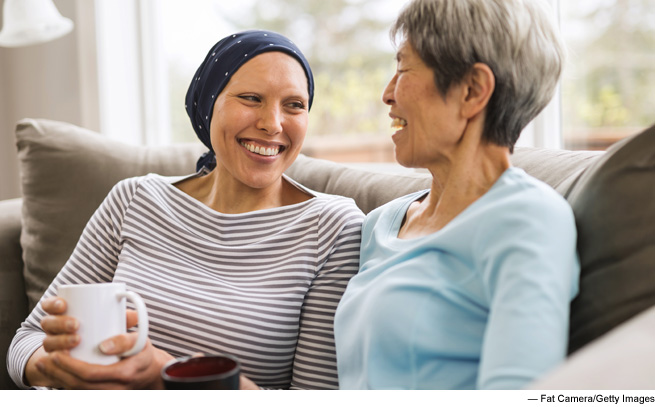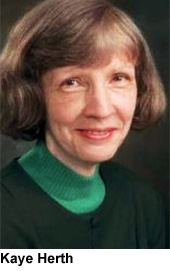How do you measure hope? The author developed a tool to do just that.
 The creator of the Herth Hope Scale and Herth Hope Index recounts her research journey and provides helpful advice to young researchers interested in following her example.
The creator of the Herth Hope Scale and Herth Hope Index recounts her research journey and provides helpful advice to young researchers interested in following her example.
 My 50 years in nursing have led to unbelievable experiences and opportunities. I’ve had the privilege to touch and be touched by so many individuals, families, and communities and have been mentored by outstanding nurse leaders. In working as a clinician and educator in a variety of healthcare settings—hospitals, hospices, and clinics—I became interested in understanding humor and hope and their relationship to health.
My 50 years in nursing have led to unbelievable experiences and opportunities. I’ve had the privilege to touch and be touched by so many individuals, families, and communities and have been mentored by outstanding nurse leaders. In working as a clinician and educator in a variety of healthcare settings—hospitals, hospices, and clinics—I became interested in understanding humor and hope and their relationship to health.
This led, in turn, to developing and conducting psychometric testing of the first multidimensional tools for measuring hope—the Herth Hope Scale and the Herth Hope Index—as well as development and implementation of the Hope Intervention Program. My research journey has focused primarily on how hope and humor can benefit people with chronic or terminal illness, their families and significant others, and those who are homeless.
My nomination in 2011 for induction into Sigma’s International Nurse Researcher Hall of Fame came as a surprise. I was then serving as dean of the College of Allied Health and Nursing at Minnesota State University, Mankato. Norma Krumwiede, EdD, RN, PHN, a professor at the college, nominated me. The application process required the support of numerous colleagues around the world and assistance from Yvette Dulohery, EdS, MSN, ACNS-BC, ANP-BC, a faculty member at Minnesota State Mankato at the time of my nomination. Both Krumwiede and Dulohery are members of Mu Lambda Chapter, as am I.
The work you do and the people you impact
Because it is difficult for me to accept awards, I reminded myself that the recognition didn’t belong to me but to all those who have positively impacted my life. My advice to nurse researchers wishing to be nominated for this or any award is not to focus on the award but on the work and people you impact. The accolades will come naturally from the results you produce.
It’s also important to stay true to your research interests and your way of being. As you seek funding, remember that all of us begin with small grants—often from private agencies—that become large public grants as our research is successful and grows. Share information about your work with others—both professional and lay audiences—through publication and presentation. Seek out strong mentors. Always remember that those who participate in your research are truly your partners.
Learn from what doesn’t go as expected. Those surprises are invaluable, and if you take advantage of the knowledge you gain, the end result can be even better than anticipated. Finally, welcome and encourage others in their research efforts—in nursing as well as other disciplines— so that nursing practice will be evidence-based.
Retired, but still researching
My induction into Sigma’s International Nurse Researcher Hall of Fame has led to connection with great research leaders who inspire and challenge me. In the seven-plus years since that memorable occasion, I have continued to be actively engaged in research, collaborating with researchers across disciplines around the world. I have also continued to mentor young researchers (including undergraduate and graduate students), faculty members, practicing nurses, and other healthcare providers from various settings and disciplines in translating my hope and humor research findings and implementing them in practice.
Ongoing interest in the benefits of hope as related to health has led to cultural adaptation and translation of the Herth Hope Index into more than 28 languages, implementation of the Hope Intervention Program in more than 40 hospitals and other healthcare facilities around the world, and a paper titled “Leadership from a Hope Paradigm” that applies my research findings to leadership.
My work has transcended disciplines, settings, and venues, as evidenced by recent requests from the following: 1) native grant recipients in tribal communities across the United States and Canada who want to apply the principles of hope in preventing suicide among indigenous peoples; 2) heart, kidney, and stem cell transplantation units across the world; 3) industrial psychologists helping workers in Puerto Rico; 4) those aiding victims of human trafficking in the United States; 5) healthcare providers working with military personnel who experience post-traumatic stress disorder following overseas deployment; 6) rehabilitation therapists working with prison inmates; 7) people counseling children and adolescents exposed to trauma; 8) major medical healthcare centers participating in clinical cancer treatment trials; and 9) participants in the Ihangane Project Hope Initiative in Rwanda.
Over the past 10 years, I have received numerous requests for a tool to measure hope in young children, so I am currently involved in developing and testing a children’s version of the Herth Hope Index. To keep current following my retirement, I stay connected to nursing and healthcare by volunteering as an educator-clinician in a free clinic for an indigent population, serving on the board of directors for a large medical center, remaining connected to students and researchers, and serving on an accreditation evaluation team for the Commission on Collegiate Nursing Education.
It has been a privilege to study humor and hope, mentor future scholars in nursing, and work with many outstanding colleagues in a field where research and practice are moving us forward. RNL
Kaye A. Herth, PhD, RN, FAAN, is dean emerita of the College of Allied Health and Nursing at Minnesota State University, Mankato in Mankato, Minnesota, USA.
Editor’s note: The International Nurse Researcher Hall of Fame award, first presented in 2010 by Sigma Theta Tau International Honor Society of Nursing (Sigma), honors nurse researchers who have achieved significant and sustained national and/or international recognition for their work and whose research has influenced the profession and the people it serves. The induction ceremony during the 30th International Nursing Research Congress, 25-29 July 2019, in Calgary, Alberta, Canada, will mark the 10th presentation of the award. Nominations are now open, and the nominating deadline is 11 December 2018. All active Sigma members worldwide are eligible. Current members of the Sigma board of directors, Sigma staff, Sigma consultants and contracted staff, and members of the judging committee are not eligible. Click here for more information.